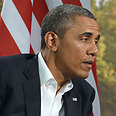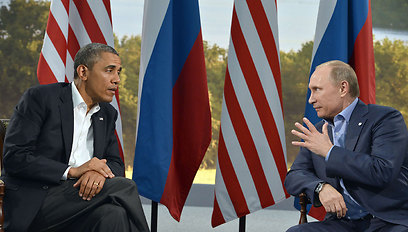
Related stories:
The selection of Hassan Rohani as president gave Putin and Obama reason for “cautious optimism,” the US president said, adding that they hoped it would help jumpstart talks on Iran’s nuclear development efforts. Rohani, who won a first-round victory in this weekend’s voting, said Monday he would pursue a policy of moderation to improve Iran’s relations with neighboring countries and beyond. He takes office in August.

Obama and Putin at G-8 summit in Ireland (Photo: AFP)
Using a translator, Putin added, “With the election in Iran we hope there are new opportunities” to resolve the region’s trensions. The two presidents spoke after a meeting in Enniskillen, Northern Ireland, where they were part of the summit of leaders from the Group of Eight nations.
While Iranian officials say their country’s nuclear program is for energy and medical research, Israel and the US say Iran is trying to develop nuclear weapons capability. Both have threatened to attack Iran should other means fail to stop the Islamic republic from trying to obtain nuclear weapons.
Britain, another G-8 member, said on Monday that the newly-elected Iranian president should be in no doubt about the West's resolve to prevent nuclear proliferation in the Middle East. Foreign Secretary William Hague said he hoped Tehran would now "engage seriously" with the West on its disputed nuclear program.
"Iran should not doubt our resolve to prevent nuclear proliferation in the Middle East and to increase the pressure through international sanctions should its leaders choose not to take this path," Hague said.
During the summit, Syria was also discussed, and Putin defiantly rejected calls from the US, Britain and France to halt his political and military support for Bashar Assad's regime.
But there were also fissures among the three Western nations, despite their shared belief that Assad must leave power. Britain and France appear unwilling – at least for now – to join Obama in arming the Syrian rebels, a step the US president reluctantly finalized last week.
The lack of consensus even among allies underscored the vexing nature of the conflict in Syria, where at least 93,000 people have been killed as rebels struggle to overtake Assad forces buttressed by support from Hezbollah, Iran and Russia.
Obama and Putin, who already have a frosty relationship, did little to hide their differing views on the matter while speaking to reporters following a one-on-one meeting on the sidelines of the summit Monday evening. The two-hour meeting marked the first time the two leaders have met in-person since last year.
"We do have different perspectives on the problem," Obama said plainly of their divergent views on Syria.
The Russian leader, speaking through a translator, agreed, saying, "Our opinions do not coincide."
But despite their seemingly intractable differences, Obama and Putin did express a shared desire to stop the violence in Syria and convene a political conference in Geneva, Switzerland, next month. Still, it's unclear who would participate in such a meeting or whether the rebels, given their weakened position, would have any leverage if they did.
AP, AFP contrbuted to this report
- Receive Ynetnews updates
directly to your desktop















